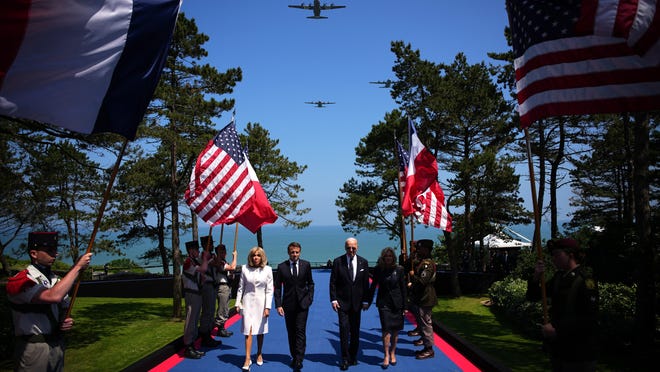An alliance of left-wing parties is set to win the most seats in France’s parliamentary elections, exit polls showed on Sunday, in a surprise defeat for Marine Le Pen’s National Rally party as voters opposed to her far-right policies appeared to heed calls from other groups to block her party from power.
French voters also appeared to punish President Emmanuel Macron’s centrist party amid the unexpected results, but not as much as pre-election polls and political pundits expected.
Exit polls across the country project the New Popular Front, a left-wing bloc led by Jean-Luc Mélenchon, to win up to 215 seats in France’s 577-seat National Assembly, followed by up to 170 seats for Macron’s centrist bloc, according to the poll, conducted by Ipsos Talan. The National Rally came in third, winning up to 152 seats.
Official results were expected later Sunday evening.
If the exit polls are accurate, the result does not immediately answer the question of which political party will be able to form the next French government. And whatever the result, the post of president of the republic is not in danger. France divides its political executive role between the president and the prime minister, with the former traditionally overseeing foreign policy and defense, while the latter has a more domestic portfolio.
Election preparation: Find out who’s running for president and compare their positions on key issues in our Voter’s Guide
With neither bloc having won an absolute majority, a period of horse-trading is likely until a coalition is formed, with perhaps, but not necessarily, Mélenchon as France’s new prime minister. Macron called the election after his party fared poorly in last month’s European elections.
“The president must bow down and admit that this is a defeat,” Mélenchon said on Sunday.
The vote comes amid deep concern about immigration, growing fears about crime and lingering worries about household budgets being hit by inflation. The election also casts a shadow over the Paris Olympics, which begin in less than three weeks.
Pooping in the Olympic River?Even the 2024 Paris Games will fail to bring together a divided France
“This vote is about putting France back on track,” said Jonathan Rodrigues, 29, a butcher from Seine-et-Marne, southeast of Paris, who supports the National Rally party, before the vote.
Rodrigues said the Macron government was a “total farce.”
The National Rally scored a historic first-round victory a week ago, raising the specter of France’s first far-right government since World War II. The party’s roots go back to the pro-Nazi Vichy government. But if exit polls are accurate, French voters on Sunday threw their support behind the New Popular Front, which includes a broad spectrum of left-wing parties, from the far left to the centrist, to prevent France from having a far-right government. The National Rally is co-led by Marine Le Pen and her 28-year-old protégé Jordan Bardella, whom she wanted to install as prime minister.
Addressing his supporters after the exit poll results were released on Sunday, Bardella criticised what he called the “unnatural” and “dishonourable” alliance that had “deprived the French people” of a National Rally victory.
“This evening,” he declared, “these alliances are throwing France into the arms of Jean-Luc Mélenchon’s far left.”
Marine Le Pen has long argued that France is held back by European policies on everything from agriculture to border security. She says NATO is a destabilizing alliance that has antagonized Russia. She has repeatedly expressed admiration for Russian President Vladimir Putin and supported former President Donald Trump before his 2016 election. French media have spent years investigating Le Pen’s financial ties to Moscow, allegations she vigorously denies.
France decides:Why is the far right so popular?
Sunday’s result could mean the election ends in a deadlock, a so-called hung parliament – a chaotic scenario in which the New Popular Front would be the dominant legislative force in the National Assembly but unable to pass laws without forming ad hoc coalitions with other parties.
Macron’s seven-year political experience of supporting businesses and reforming the welfare state is tainted. But the 46-year-old former banker and management consultant, who has become internationally known in recent years for his relentless efforts to draw diplomatic attention to Ukraine since the Russian invasion, has ruled out stepping down. His term does not expire until 2027.
Raising the retirement age, solidarity with Israel
In France, Macron has angered many voters with his attempts to reform public services and social policies, including the retirement age. He has also angered left-wing voters who have criticized him for pushing through legislation to reform residency and citizenship tests, which have won approval from the far right. He has expressed “unconditional solidarity” with Israel over its war against Hamas in Gaza and called for a ceasefire.
They see him as “elitist, arrogant” and out of touch with France’s working and middle classes, said Jean-Yves Camus, an expert on far-right politics at the Paris-based French Institute for International and Strategic Relations.
Camus said many far-right voters in France say they see Le Pen and Bardella as politicians who “show common sense” on issues ranging from the economy to immigration. But he said they often forget that “doing politics in a country like France, which is so divided, is really difficult.”
“What is common sense in immigration?” he asked.
“You can’t just put up borders or a fence and say, ‘We’re not allowing any more immigrants.'”
In his speech, Mr Bardella said Macron had pushed France towards “uncertainty and instability”, adding that “for months, a wind of hope has been blowing and it will never stop blowing. It all starts tonight”.


